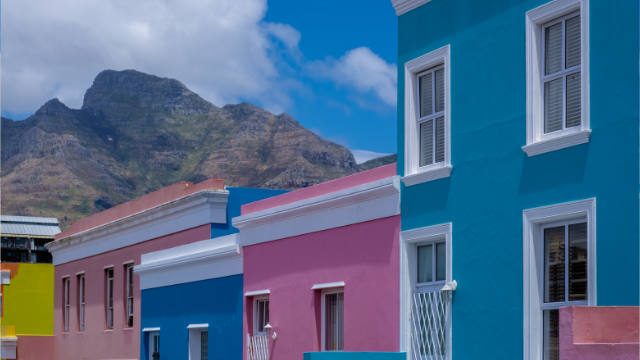South Africa
Travel to South Africa and immerse yourself in a land where nature's grandeur meets vivid cultural tapestry. From the thundering roar of Victoria Falls to the serene whispers of the Cape Winelands, South Africa offers an unparalleled symphony of sensations. Feel the pulse of Cape Town's vibrant streets, where the colorful facades of the Bo-Kaap are mirrored by the patchwork elegance of Table Mountain's flora. Listen closely as the rhythmic drumming from Vuvuzelas echoes in your heart, heralding the spirit of unity from every stadium filled with passionate voices. Let the spicy aromas of a traditional Braai waft into your senses, tantalizing your taste buds with the promise of exotic flavors. As you wander through the fabled savannas of Kruger National Park, witness the majestic silhouettes of elephants at sunset, painting the horizon with their timeless grace. Each moment you spend in South Africa entwines you in its vibrant energy, beckoning you to explore deeper and discover its boundless treasures.
South Africa Travel Season
When planning a journey to South Africa, timing is key to optimizing your experience. This diverse country offers a range of climates and activities throughout the year, making the decision of when to travel to South Africa an important one. Understanding the varying seasons and what each brings can enhance your travel experience significantly.
The summer months from December to February mark the peak travel season in South Africa. This period coincides with national school holidays, resulting in bustling tourist spots, particularly in coastal regions like Cape Town and Durban. The weather during these months is typically hot, with temperatures often soaring above 30°C (86°F) in the interior and cooling off a tad along the coastline. Travelers can enjoy a vibrant atmosphere, filled with local events and festivals, such as the Harvest Festival in the Cape Winelands. While embodying the lively spirit of summer, traveling during this time also means higher accommodation costs and crowded attractions.
If you prefer a more tranquil experience, traveling to South Africa during the shoulder seasons offers an ideal balance. The months of March to May and September to November are celebrated for their mild weather and fewer tourists. These periods are particularly favorable for exploring the country's renowned national parks and game reserves, as wildlife is more visible and accommodation can be more affordable. Autumn in the Southern Hemisphere, experienced from March to May, brings cool, clear days, making it perfect for hiking in destinations like the Drakensberg Mountains. Spring, from September to November, presents the added spectacle of blooming flowers in the Western Cape's wildflower region.
Winter in South Africa, from June to August, provides yet another unique angle for travelers. While it might seem counterintuitive to travel during the colder months, this time offers perks such as excellent game viewing. Winter's dry conditions lead animals to congregate around water sources, offering unrivaled opportunities for wildlife photography. Additionally, travelers can find reduced rates at premier lodges and safari experiences. The Cape Town region experiences its wetter weather during these months, which might not be ideal for beach goers, but offers a quieter city experience and the charm of a cozy, fireside evening in a local wine estate.
Besides weather considerations, travelers should be mindful of specific local holidays that might affect their plans. South Africa's Heritage Day in September and National Braai Day are celebrated with enthusiasm, providing a chance to engage with local culture and traditions. However, local events might lead to limited availability of certain services or accommodations, requiring travelers to plan ahead.
The off-peak perks of traveling to South Africa can significantly enhance your trip, providing a more personalized experience away from the crowds. Whether you're exploring the series of diverse landscapes, participating in vibrant local traditions, or indulging in a world-renowned wine tasting, understanding the seasonal dynamics is essential to making the most of your travel to South Africa. By planning accordingly, travelers can ensure a memorable experience tailored to their interests and observing South Africa at its best.
The Weather and Seasons in South Africa
When you travel to South Africa, prepare to encounter a diverse climate that stretches over its expansive geography. South Africa’s weather is known for its sunny and temperate disposition, but it varies significantly across different regions, making every part of the country a unique exploration experience.
Spring in South Africa
Spring in South Africa, from September to November, welcomes travelers with warming weather after the chill of winter. Average daytime temperatures range from 68°F to 86°F (20°C to 30°C). Rainfall begins to increase in the eastern parts, such as KwaZulu-Natal, offering lush landscapes ideal for wildlife lovers. Travel to South Africa during this period is pleasant due to the lower humidity levels compared to summer months.
Summer Adventures in South Africa
December through February marks the summer season in South Africa. Coastal regions such as Cape Town enjoy a Mediterranean-esque climate, with temperatures often between 68°F and 84°F (20°C to 29°C), and occasional southeast winds bring refreshing breezes. The northern areas, like Johannesburg, can reach highs of 95°F (35°C), accompanied by thunderstorms. Summer is a prime time for beach travel and enjoying dynamic festivals that celebrate the cultural vibrancy of South Africa.
Fall’s Arrival in South Africa
March to May in South Africa ushers in fall, a season characterized by mild temperatures and dwindling rain in the areas that receive summer rainfall. The temperature during this season is comfortable, ranging from 59°F to 77°F (15°C to 25°C). The Western Cape experiences its driest days, offering ideal conditions for vineyard tours and explorations of the famous Garden Route. Fall is well-suited for travel to South Africa, especially for those seeking fewer crowds and picturesque landscapes.
Winter and Wildlife Events in South Africa
June to August signals winter in South Africa, oftentimes accompanied by cooler temperatures and dry conditions in the northern regions. Temperatures can dip to around 32°F (0°C) in places like the Drakensberg Mountains, while coastal cities like Durban maintain milder climates, remaining around 59°F to 68°F (15°C to 20°C). Travel to South Africa during the winter is ideal for safaris as vegetation thins, enhancing game viewing opportunities. This period also coincides with the annual sardine run along the KwaZulu-Natal coastline, a spectacle for nature enthusiasts.
Best Weather for Travelers
For those considering travel to South Africa, the best weather conditions generally occur during the shoulder seasons of spring and fall. During these times, temperatures are moderate, and the tourism landscape is less crowded. These conditions make for favorable hiking experiences in the Drakensberg, exploring the cityscapes of South Africa like Johannesburg and Cape Town, or enjoying the unique floral biodiversity in areas such as Namaqualand.
Whether you're drawn by the idea of a warm summer beach holiday or a crisp winter safari, travel to South Africa offers an array of experiences shaped by its varied climate. As you plan your adventure, consider the seasonal variations and local events that define this diverse and vibrant country, allowing you to fully immerse in the South African way of life.
Accepted Payment Methods and Other Payment Information in South Africa
When planning travel to South Africa, understanding the country's payment options is essential for a smooth and enjoyable experience. The official currency in South Africa is the South African Rand (ZAR), symbolized as "R." Travelers will find the Rand to be the primary medium of exchange throughout the country. Banks and currency exchange outlets are readily available in major cities, enabling easy conversion of foreign currencies to Rand.
Credit cards, including Visa, Mastercard, American Express, and Discover, are widely accepted in South Africa, especially in urban areas. Visa and Mastercard are the most commonly used and are accepted at a majority of retail stores, restaurants, hotels, and car rental services. While American Express and Discover are accepted, their usage is less widespread, meaning travelers should have alternative payment methods available. It’s advisable to notify your bank of your travel to South Africa to avoid any complications with your credit card while abroad.
For those embracing the adventure of travel to South Africa, carrying some cash can be beneficial. Although credit cards are favored, especially for larger transactions, smaller vendors, markets, and rural areas may prefer cash. Automated Teller Machines (ATMs) are available in cities and towns, allowing travelers to withdraw Rand using a debit or credit card. However, ensure your card is internationally enabled if you plan to use it at ATMs.
When it comes to tipping in South Africa, it is customary but not obligatory, and service charges are not always included in the bill. In restaurants, a tip of 10 to 15 percent is generally appreciated, while porters and taxi drivers might expect a small gratuity in recognition of good service. Tipping in cash is usually preferred and any amount in Rand is appreciated.
Travelers should be mindful of safety and security when handling payments in South Africa. Using contactless payments can be an excellent way to minimize the handling of cash. Furthermore, being vigilant about ATM usage in well-lit, populated areas and avoiding flashing large amounts of money can ensure one's travel experience remains secure and pleasurable. Overall, the combination of multiple payment methods will enhance your travel experience to South Africa, allowing you to enjoy the diverse offerings of this beautiful nation without a hitch.
Why You Should Travel to South Africa
Travel enthusiasts will find South Africa a vibrant destination bursting with diverse experiences that cater to every type of traveler. As more people opt to travel to South Africa, they discover a country with a rich tapestry of cultures, stunning landscapes, unique wildlife, and unforgettable adventures.
Adventure in the Wild
One of the primary reasons travelers flock to South Africa is the unparalleled opportunity to experience its breathtaking wildlife. The country is home to the Big Five—lion, leopard, rhinoceros, elephant, and Cape buffalo—which can be spotted in famous parks such as Kruger National Park and Addo Elephant National Park. For those who love wildlife photography or simply wish to witness nature in its rawest form, South Africa's national parks offer unique and thrilling safaris.
Diverse Cultural Tapestry
Travel to South Africa is often synonymous with immersing oneself in its rich cultural heritage. From the traditional Zulu culture to the vibrant Cape Malay community in Cape Town, South Africa is a melting pot of cultures, each with its own customs, music, dance, and cuisine. Visitors can explore cultural villages, attend festivals, and even participate in traditional ceremonies to gain a deeper understanding of the country’s diverse cultures.
Spectacular Natural Beauty
South Africa boasts diverse landscapes, ranging from the arid deserts of the Karoo to the lush forests of Tsitsikamma. Table Mountain in Cape Town offers stunning views and is a must-see for any traveler to South Africa. The Drakensberg Mountains provide excellent opportunities for hiking, with trails that showcase waterfalls, rock formations, and indigenous flora and fauna.
Thriving Wine Industry
For wine enthusiasts, travel to South Africa opens up a world of diverse vineyards and wine estates. The Western Cape region is renowned for its wine production, with stunning estates in Stellenbosch, Franschhoek, and Paarl offering tastings, tours, and luxurious accommodations. The country's wine culture is deeply intertwined with its history, making it a cultural experience as well as a culinary delight.
Vibrant Cities
South Africa’s cities, such as Johannesburg and Cape Town, offer vibrant urban experiences that blend modernity with rich history. In Johannesburg, visitors can explore the Apartheid Museum for a poignant journey through the nation’s past. Meanwhile, Cape Town provides a cosmopolitan atmosphere with its bustling Victoria & Alfred Waterfront, historic Robben Island, and the artistry of the Woodstock district.
Unique Coastal Experiences
South Africa offers some of the most remarkable coastal experiences in the world. The Garden Route is a scenic drive that takes travelers through charming towns, lush forests, and along breathtaking coastlines. For those seeking a beach holiday, the sunshine and sandy beaches of the Eastern Cape and KwaZulu-Natal offer a perfect setting. Additionally, the country's coasts provide opportunities for whale watching, cage diving with great white sharks, and exploring tidal pools teeming with marine life.
Culinary Delights
No travel to South Africa is complete without indulging in its culinary scene, which is as diverse as its people. From the Cape Malay curries and bobotie to biltong and traditional braai, or barbecue, travelers can enjoy a smorgasbord of flavors. The bustling markets and upscale restaurants alike offer local delicacies that cater to all tastes.
A Haven for Adventure Seekers
For those who crave adventure, South Africa offers an array of adrenaline-pumping activities. From bungee jumping off the towering Bloukrans Bridge to paragliding over Cape Town and white-water rafting on the Orange River, South Africa presents a playground for thrill-seekers. The varied terrain and climate ensure that there is something for every adventure enthusiast at any time of year.
Rich and Compelling History
Traveling in South Africa allows one to delve deeply into its compelling history. Sites such as the Cradle of Humankind, a UNESCO World Heritage site, offers insight into early human history, while Robben Island stands as a testament to the country's more recent struggles against apartheid. These historical landmarks and museums serve not only as educational experiences but also invite reflection and understanding of the nation's past.
Warm and Welcoming People
One of the most memorable aspects of travel to South Africa is the warmth and hospitality of its people. South Africans are known for their friendly and welcoming nature, making any visit to the country feel like a homecoming. Whether engaging with locals in the vibrant streets of Soweto or learning from guides on a wildlife safari, the people of South Africa enhance the travel experience with their stories, smiles, and genuine hospitality.
The History of South Africa
Travel to South Africa offers an unparalleled opportunity to explore a land rich in history, marked by both adversity and triumph. The region's history dates back to the earliest days of human existence, with evidence found in the famous Cradle of Humankind, a UNESCO World Heritage site. Here, you can examine intricate networks of caves that have yielded some of the oldest hominin fossils ever discovered, providing a fascinating glimpse into the evolution of humans. This is a must-visit for anyone interested in the origins of humanity and sets the stage for understanding South Africa's historical and cultural journey.
South Africa's more recent past is equally compelling, dominated by the struggle against apartheid, a policy of racial segregation that gripped the nation for over four decades. Key sites, such as the Apartheid Museum in Johannesburg and Robben Island near Cape Town, where Nelson Mandela was imprisoned for 18 years, draw history enthusiasts from around the world. These landmarks tell the stories of resistance, hope, and ultimately, the reconciliation that followed the apartheid era, offering insight into the country's complex social fabric. Travel to South Africa enables visitors to witness firsthand how history has many layers, each contributing to its current identity.
Beyond political history, South Africa is a tapestry of cultural heritage, seamlessly blending indigenous traditions, colonial influences, and immigrant cultures. The Rainbow Nation, as South Africa is affectionately called, boasts a diversity of languages, cuisines, and crafts. The Zulu Kingdom and the Xhosa traditions are particularly noted, with cultural villages providing immersive experiences into their ancient rituals and art forms. Travel to South Africa hence becomes a journey through time, offering a window into how these traditions have persisted and adapted in a modern context, accentuating their beauty and resilience.
This historical richness extends naturally into the nation's geography, with spectacular landmarks such as Durban's ancient uKhahlamba-Drakensberg Mountains, which include rock shelters with ancient San rock art, and the historic settlements of the Cape Dutch architecture in Cape Town. The unique landscape has not only shaped the cultural practices of its people but also invites travelers to explore the natural beauty that has been inseparable from South Africa's narrative. These sites are more than just travel destinations; they are living histories that invite both reflection and adventure, ensuring that your travel to South Africa will be an experience marked by discovery and wonder.
The Culture of South Africa
The cultural tapestry of South Africa is as mesmerizing as its vast landscapes, rich in diversity and vibrancy unmatched by many other nations. This nation is a kaleidoscope of ethnicities and traditions, each contributing to an intricate and inclusive cultural mosaic. The essence of South African culture is captured through its lively festivals, daily practices, and socio-cultural dynamics that evoke curiosity and admiration among travelers. Traveling to South Africa offers an unparalleled opportunity to delve into this multifaceted society, where the warmth of its people and the echoes of history poetically coexist.
South Africans take pride in celebrating a variety of festivals that showcase their diverse heritage and traditions. Events like the National Arts Festival in Grahamstown, the Cape Town International Jazz Festival, and the Durban July horse race are just a few of the country’s illustrious celebrations that draw global attention. Each festival provides a platform for traditional art, dance, and music, where you can experience the pulsating rhythms of the djembe drum or the harmonic melodies of the marimba. These communal gatherings create a lively atmosphere that invites travelers to participate in jubilant expressions of culture that highlight South Africa as a prime travel destination.
Daily life in South Africa is steeped in customs that reflect the country’s varied cultural influences. From an early morning tradition of sharing rooibos tea to the braai, a social barbecue that unites families and friends, every aspect of life takes on a culturally specific hue. The spirit of Ubuntu, a Bantu philosophy that emphasizes community and shared human values, permeates the interactions in South African neighborhoods. Such values extend to the indigenous tribes such as the Zulu, Xhosa, and San people, who continue to preserve their ancestral ways through language, clothing, and rituals, offering travelers a meaningful glimpse into their enduring practices.
South African art forms are a testament to the country's profound cultural depth, merging ancient traditions with modern expression. Whether it's the striking visual arts found in local markets, the emotive story-telling through Ndebele beadwork, or the energetic rhythms of the Gumboot dance, these expressions are invitations for any traveler to gain insight into the soul of the South African people. Efforts to preserve indigenous culture are evident in initiatives like the Cradle of Humankind—a UNESCO World Heritage Site—that highlights the importance of palaeoanthropology and the rich human history integral to South Africa. Travel to South Africa to not only behold its breathtaking scenery but also to immerse yourself in a cultural narrative that is as compelling as it is welcoming.
The Culinary Experience of South Africa
When you travel to South Africa, a remarkable culinary landscape awaits you, reflecting the country's vibrant mix of cultures and traditions. The South African culinary scene is an intriguing blend of local favorites and international influences, with a focus on freshness and flavor. Among the must-try dishes, you will encounter "bobotie," a fragrant curried meat dish with Malay origins, often served with yellow rice. "Biltong," a type of cured meat similar to jerky, offers a taste of South African snack culture. Furthermore, "bunny chow," a street food delight consisting of hollowed-out bread filled with spicy curry, showcases the Indian influence on South African cuisine.
For those seeking unique dining experiences, South Africa offers a plethora of options, from bustling food markets to upscale vineyards. In cities like Johannesburg and Cape Town, food markets such as Neighbourgoods Market and V&A Food Market provide a lively atmosphere where travelers can sample local delicacies and artisanal products. Additionally, the street food scene is not to be missed, with vendors offering everything from grilled meats to roasted corn. On the other hand, fine dining establishments like The Test Kitchen in Cape Town offer contemporary twists on South African flavors, delivering innovative dishes that tell a story of the land and its people.
The wine, spirits, and beer of South Africa form an integral part of its culinary tapestry. The country's wine regions, such as Stellenbosch and Franschhoek, are renowned for their exquisite vineyards. Travelers can embark on wine tours to sample rich reds, crisp whites, and the iconic Pinotage, a unique grape variety native to South Africa. For something stronger, the local brandy, distilled from the country's abundant vineyards, offers refined sipping experiences. Beer enthusiasts will enjoy tasting craft beers from breweries across South Africa, where flavors are inspired by traditional African ingredients and brewing methods.
Culinary traditions in South Africa are deeply rooted in the country's diverse heritage, and seasonal dishes and food festivals celebrate this rich cultural tapestry. The Cape Malay and Afrikaans cuisines are predominantly featured during these events, such as the annual South African Cheese Festival or the Franschhoek Bastille Festival, where visitors can indulge in local cheese, wine, and other delicacies. The South African food landscape also caters to various dietary needs, with vegan and vegetarian options that draw on the country's abundance of fresh produce. Many establishments offer plant-based versions of classic dishes, ensuring that all travelers have the opportunity to savor the distinctive flavors of South Africa during their visit.
What to See and Do in South Africa
Spanning diverse landscapes and cultures, South Africa is a vibrant country teeming with captivating sights and unforgettable experiences for travelers. Whether you are seeking adventure, cultural insight, or natural beauty, exploring South Africa promises a journey like no other.
Exploring the Magnificence of Table Mountain
Table Mountain is more than just a backdrop to the city of Cape Town; it's a world-renowned landmark that offers stunning panoramic views. Adventurers can hike up one of the several trails, while those preferring comfort can take the scenic cableway to the summit. At the top, breathtaking vistas of the city, the Atlantic Ocean, and the surrounding mountain ranges unfold, making the climb worthwhile. This destination is a must-visit for photography enthusiasts looking to capture South Africa's natural beauty.
Diving into the History of Robben Island
Travel to South Africa would be incomplete without visiting Robben Island, a symbol of the country's complex past and resilience. As the notorious prison where Nelson Mandela was held for 18 years, the museum offers tours led by former inmates who provide unique, personal insights into life on the island. Engaging and educational, this excursion is ideal for those interested in the historical and political tapestry of South Africa, and it often leaves visitors with a profound sense of the country's journey towards freedom.
Embarking on a Safari in Kruger National Park
Kruger National Park is synonymous with wildlife adventures in South Africa, offering one of the most exhilarating safari experiences in the world. Spanning nearly two million hectares, the park teems with extraordinary biodiversity, including the famed Big Five—lions, elephants, leopards, rhinoceros, and buffalo. For families with children and solo travelers alike, guided tours provide safe and educational encounters with wildlife, immersing visitors in South Africa's untamed beauty.
Reveling in the Vibrancy of the Cape Winelands
The Cape Winelands offer a delightful journey through South Africa’s premier wine-producing region, featuring breathtaking landscapes, lush vineyards, and charming estates. Visitors can enjoy wine tastings and exquisite meals in towns like Stellenbosch, Franschhoek, and Paarl. With a combination of celebrated wines, gourmet cuisine, and picturesque scenery, this region is perfect for those looking to savor South African culture in a relaxed, sophisticated setting.
Discovering Zulu Culture in KwaZulu-Natal
KwaZulu-Natal provides an enriching cultural experience through the exploration of the Zulu heritage. Travelers can visit traditional Zulu villages and participate in authentic cultural demonstrations, including dance performances and craft-making. This immersive experience is perfect for cultural enthusiasts eager to learn about South Africa's indigenous traditions and folklore, offering a deep connection to the country's diverse ethnic tapestry.
Strolling Through the Kirstenbosch Botanical Gardens
Nestled at the eastern foot of Table Mountain, Kirstenbosch Botanical Gardens is a haven for nature lovers and botany enthusiasts. Renowned as one of the most beautiful gardens in the world, it features an extensive collection of South African flora. Visitors can enjoy leisurely walks through the native plant sections or embrace the aerial Centenary Tree Canopy Walkway, making it an excellent addition to any itinerary for those exploring the natural wonders of South Africa.
Enjoying the Coastal Delight of Garden Route
The Garden Route, stretching between Mossel Bay and Storms River, is a coastal paradise filled with diverse natural attractions. From pristine beaches to lush forests and tranquil lagoons, each stop along this scenic drive offers unique outdoor activities, such as hiking, bungee jumping, and whale watching. This region is an ideal choice for adventure seekers and families alike, providing a comprehensive snapshot of South Africa's enchanting and varied landscapes.
Marvelling at the Blyde River Canyon
As the third-largest canyon in the world, the Blyde River Canyon is a striking destination that captivates with its lush scenery and legendary viewpoints like God’s Window. The canyon offers remarkable opportunities for hiking and exploring its pristine trails while enjoying views of waterfalls and diverse wildlife. This hidden gem is perfect for travelers seeking a quieter yet equally thrilling South African adventure.
Feasting at the Cape Town Food Markets
For food lovers, Cape Town's bustling markets offer a vibrant culinary adventure. The Neighbourgoods Market and Oranjezicht City Farm Market invite you to taste local delicacies, organic produce, and artisanal creations. This gastronomic journey is a feast for the senses and an ideal way to experience the diverse flavors that define South Africa's culinary scene, making it a perfect outing for families and solo travelers with a passion for food.
Exploring the Rich History of the Apartheid Museum
A visit to the Apartheid Museum in Johannesburg provides a profound exploration of South Africa's poignant and turbulent history. Through interactive exhibits, visitors can trace the timeline of apartheid and witness narratives of struggle and triumph. This museum stands as a poignant reminder of the nation's resilience and progress, offering travelers an important and reflective experience as they delve into the social and political fabric of South Africa.
Tips & Tricks for Traveling in South Africa
Travel to South Africa by Understanding Local Etiquette
Familiarize Yourself with South African Etiquette
When planning your travel to South Africa, it's essential to understand local customs and etiquette to make your experience more enjoyable. South Africans are generally friendly and hospitable, but it’s polite to greet people with a warm handshake. In more formal settings, you might be greeted with a cheek kiss from certain cultures within South Africa. Respect is crucial, and it’s customary to use titles and last names unless instructed otherwise. Being aware of these cultural nuances can greatly enrich your travel experience in South Africa.
Optimizing Travel Routes
South Africa's vast landscapes can be both enchanting and challenging to navigate, so it’s smart to plan your travel routes in advance. If you're considering long-distance travel, the country's domestic flights are efficient and relatively inexpensive, connecting major cities like Johannesburg, Cape Town, and Durban. For road travel, renting a car gives you the flexibility to explore at your own pace. Remember, South Africans drive on the left-hand side, and road conditions vary, especially in rural areas. Ensuring you have a reliable GPS or a local SIM card for navigation can enhance your travel to South Africa significantly.
Budgeting for Travel in South Africa
While travel in South Africa can be more affordable than in many Western countries, it’s crucial to budget wisely. Prices can vary greatly between urban centers and rural areas. Use local public transportation, like MyCiTi buses in Cape Town or the Gautrain in Johannesburg, for cost-effective travel. Dining where the locals eat not only saves money but also offers an authentic South African culinary experience. Look out for local markets and grocery stores, especially if you are on a budget as they often have fresh and inexpensive produce.
Avoiding Crowds for a Authentic Experience
To truly savor travel in South Africa, seek out less crowded destinations. While popular tourist spots like Table Mountain and Kruger National Park are must-sees, exploring them during off-peak hours can enhance your experience. For a truly serene journey, visit smaller reserves or beaches along the West Coast or Eastern Cape that remain unspoiled by mass tourism. Exploring lesser-known wine routes or conservation areas can provide a unique and tranquil South African travel experience.
Solo Traveler Safety Tips
If you plan to travel to South Africa alone, prioritize safety to maximize enjoyment. Stay connected by sharing your travel itinerary with a trusted friend or family member and check in regularly. You should avoid walking alone at night in unfamiliar areas and use reputable taxi services or ride-sharing apps instead. Opt for accommodations with good reviews, and consider joining group tours to meet fellow travelers, which can enhance security and provide companionship.
Leveraging Local Knowledge
To enrich your travel experience in South Africa, try engaging with local tour guides who can offer insights into the country’s rich history and culture that you might otherwise miss. They can take you to lesser-known but equally breathtaking sights and even advise on where to eat and shop like a local. Many areas have community-informed tours which not only support local economies but also give you a more grounded understanding of each region's unique qualities.
Photography Tips for Capturing South Africa
If you’re a photography enthusiast planning to travel to South Africa, timing and location are vital for capturing its stunning landscapes and diverse wildlife. Opt for early morning or late afternoon light, known as the "golden hour," to add depth and warmth to your images. Venturing into the Drakensberg Mountains or the dramatic coastlines of the Wild Coast will provide you with awe-inspiring backdrops. For wildlife photography, research game reserves that offer guided photography tours, ensuring you achieve the best shots possible.
Embrace the Delicious Local Cuisine
Food is a significant part of the South African travel experience. Don’t miss trying dishes like “bobotie,” “bunny chow,” or grilled meats like “biltong” and “boerewors.” Exploring local eateries not only supports the community but also allows you to savor authentic flavors. Participate in a “braai” (barbecue), a quintessential South African experience, often hosted by locals in a communal setting where travelers are warmly welcomed.
Respecting Nature and Wildlife
When encountering the natural wonders on your travel to South Africa, it’s essential to follow responsible tourism practices. Stick to designated paths in nature reserves to preserve wildlife habitats. If you're on a safari, respect the park’s safety guidelines and maintain a distance from wild animals. South Africa’s biodiversity is a national treasure, and your conscientious behavior helps ensure its preservation for future visitors.
Using Technology to Improve Your Journey
Leveraging technology can significantly enhance your travel to South Africa. Download travel apps that help you locate essential services, discover attractions, and navigate public transit systems. Purchasing a local SIM card with data packages allows you to stay connected, easily access maps, and even keep up with local news, giving you peace of mind and enriching your travel experience even further.
What To Know Before You Go to South Africa
When planning your travel to South Africa, it's important to be well-prepared to ensure a smooth and enjoyable experience. One of the first considerations is understanding the entry requirements. Most travelers will need a visa to enter South Africa, which can generally be applied for online or through a South African embassy or consulate. However, citizens from many countries, such as the United States and some European nations, are exempt from obtaining a visa for short stays. It's always a good practice to check the latest visa requirements specific to your nationality.
Health precautions are an important aspect of your travel to South Africa. Travelers are often advised to consult their medical professional about necessary vaccinations. Common vaccinations include hepatitis A and B, typhoid, and rabies. Malaria is a risk in some regions, so anti-malarial medication may be needed. In terms of travel insurance, comprehensive coverage is advisable to protect against unexpected medical expenses or travel disruptions.
Local Customs and Etiquette
Understanding local customs and etiquette can enrich your travel experience in South Africa. South Africans are known for their diverse cultures and friendly demeanor. It is common to greet people with a handshake, and eye contact is seen as a sign of attentiveness. When visiting someone's home, it's customary to bring a small gift, and it's polite to ask before taking photographs of individuals or cultural ceremonies. Respect for cultural diversity is highly valued throughout South Africa.
Transportation Options
Transportation in South Africa offers a variety of options for travelers. Public transportation like buses and trains are widely available in larger cities, while services such as MyCiTi buses in Cape Town provide safe and reliable transit. Renting a car is a popular choice for those wanting to explore off-the-beaten-path destinations at their own pace. However, drivers should be aware that South Africa drives on the left side of the road, and road conditions can vary. Ride-sharing and metered taxis are also available, particularly in urban areas.
Tipping Culture
Tipping is customary in South Africa and usually ranges from 10% to 15% in restaurants. For other services, such as taxi drivers, porters, or hotel staff, it’s common to tip a small amount, generally around 10 to 20 ZAR (South African Rand) depending on service quality. Some establishments may add a service charge to your bill, so be sure to check before tipping separately.
Common Phrases and Communication Tips
English is widely spoken and understood throughout South Africa, making it relatively easy for English-speaking travelers to communicate. However, South Africa has eleven official languages, including Afrikaans and Zulu. Learning a few key phrases in Afrikaans or Zulu can be a sign of respect and may enrich your interactions with locals. For instance, "dankie" means "thank you" in Afrikaans, and "sawubona" means "hello" in Zulu.
Lastly, for travelers who may encounter communication barriers, having a translation app on your smartphone can be immensely helpful. Additionally, observing local communication styles, such as the way people greet each other, can also aid in social understanding when traveling in South Africa.
Accessibility in South Africa
Travel to South Africa offers a diverse experience with rich cultural heritage and stunning landscapes. For travelers with various accessibility needs, there are numerous provisions in place to ensure a comfortable journey across this vibrant nation. The country's efforts to enhance accessibility are evident in infrastructure developments and initiatives that prioritize inclusivity for all visitors.
Physical Accessibility for Those with Limited Mobility
South Africa has made significant strides in ensuring accessible travel for those with limited mobility. Major cities like Cape Town, Johannesburg, and Durban feature improved infrastructure, such as wheelchair-accessible ramps, elevators, and designated parking spaces. Airports in these cities often have well-equipped terminals to cater to travelers using wheelchairs, with attentive airport staff readily available to offer assistance.
Accommodation Amenities
The landscape of accommodations in South Africa is increasingly inclusive. Many hotels and lodges provide accessible rooms with features like roll-in showers, grab bars, and lower countertops. These facilities often have staff trained in assisting guests with disabilities, ensuring a comfortable stay. Larger international hotel chains typically set the standard for accessibility, but smaller establishments are also beginning to incorporate similar features to meet diverse traveler needs.
Accessible Public Transportation
In recent years, South Africa has focused on improving its public transportation infrastructure to support accessible travel. Services like the MyCiTi buses in Cape Town are equipped with low-floor buses, ramps, and spaces designated for wheelchair users. Gautrain, the rapid rail system in Johannesburg and Pretoria, also offers step-free access and facilities for those with mobility challenges. Despite these advancements, travelers are advised to verify the accessibility of public transport services prior to travel, as some areas may still be under development.
Visual and Auditory Accommodations
Travel to South Africa can also comfortably accommodate those with visual and auditory needs. Places like airports have Braille signs and guiding blocks to assist visually impaired travelers. While not ubiquitous, some museums and tourist attractions offer audio guides or sign language-interpreted tours, providing an inclusive experience. It's advisable to check with specific attractions in advance to learn about available services.
Accessible Tourist Attractions
South Africa's efforts in accessibility extend to its tourist attractions. The iconic Table Mountain, a must-visit location when traveling to South Africa, is equipped with wheelchair-friendly cable cars and pathways, allowing all visitors the chance to appreciate the breathtaking views. National parks, such as Kruger National Park, offer accessible safari vehicles and accommodations, ensuring that travelers of all abilities can enjoy a quintessential African safari.
Altogether, South Africa is increasingly welcoming to travelers with diverse accessibility needs. While the journey towards complete inclusivity is ongoing, significant strides are being made to ensure that all visitors can enjoy the unique offerings of this remarkable destination. For those planning to travel to South Africa, researching specific needs in advance is recommended to ensure smooth and enjoyable experiences.
Health & Safety in South Africa
Travel to South Africa offers a captivating experience filled with diverse cultures, stunning landscapes, and rich wildlife. However, travelers should be aware of several safety concerns to ensure a safe and enjoyable journey. One primary consideration for travelers is water safety. In major cities, tap water is generally safe to drink, but in rural areas, it's advisable to stick to bottled or filtered water to avoid any potential health issues. Travelers should also consider using water purification tablets or portable filters if they plan to spend significant time in remote locations.
Natural Disaster Risks
While South Africa is not prone to many natural disasters, travelers should remain informed about certain environmental conditions that might affect their travel plans. For instance, the Western Cape region can experience seasonal wildfires during hot, dry periods, and the eastern parts of the country, including KwaZulu-Natal, may face heavy rains and occasional floods. Checking local weather forecasts and news reports can help travelers stay informed and make necessary adjustments to their travel itineraries.
Crime in South Africa
When planning your travel to South Africa, it's essential to be aware of crime-related risks, including pickpocketing and theft. In urban areas like Johannesburg and Cape Town, petty crime is more frequent, particularly in crowded places such as markets, public transport, and tourist hotspots. Travelers should exercise caution by securing valuables, avoiding displays of wealth, and staying vigilant in unfamiliar settings. Hiring a reputable local guide can also enhance your safety during tours and excursions.
Political and Social Unrest
South Africa occasionally experiences political and social tensions, but these incidents are generally confined to specific areas and do not typically impact tourists directly. Visitors should stay updated with local news and travel advisories from their home countries to avoid regions experiencing unrest. Keeping in touch with your embassy or consulate during your travel to South Africa is also a good practice.
Health and Safety Precautions
Access to healthcare in South Africa is generally good in urban centers where private hospitals provide high-quality services. Travelers are advised to have comprehensive travel insurance that covers health needs, including evacuation, if necessary. Vaccination requirements may vary, but it's commonly recommended to have vaccinations for hepatitis A, hepatitis B, typhoid, and yellow fever, particularly if traveling from a region with a yellow fever risk. Additionally, malaria prevention is advisable if visiting northern parts of the country or game reserves. Precautions like using mosquito repellent and sleeping under nets are effective measures against mosquito bites.
By understanding and preparing for these safety concerns, travelers to South Africa can enjoy a rewarding and memorable experience in this diverse and vibrant destination.
Other Places You Might Like
Kruger National Park - Nestled within the vast landscape of northeastern South Africa, Kruger National Park is a haven for wildlife enthusiasts. Those who love the remarkable biodiversity of South Africa will find a similar wonder in the Serengeti National Park, Tanzania. The Serengeti offers an unparalleled wildlife spectacle with its annual Great Migration, where millions of wildebeests and zebras traverse the plains, echoing the diverse wildlife sightings one would experience when they travel to South Africa. From the thriving Big Five populations to the expansive African savannahs, the Serengeti presents an insight into Africa's untamed beauty, captivating the adventurous spirits of those who enjoyed South Africa.
Table Mountain, Cape Town, South Africa - A trip to South Africa is incomplete without ascending the iconic Table Mountain. Lovers of this South African natural wonder will discover a similarly awe-inspiring experience at Corcovado Mountain, Rio de Janeiro, Brazil, home to the Christ the Redeemer statue. Like Table Mountain, Corcovado offers breathtaking panoramic views of a bustling coastal city blending with nature. Travelers will appreciate the rich biodiversity and unique atmosphere characterized by the lush Atlantic rainforest and cacophony of colors from the urban landscape, reminiscent of Cape Town’s own vibrancy.
Stellenbosch, South Africa - For those who relish the lush vineyards and world-renowned wine offerings when they travel to South Africa, the Napa Valley in California, USA, provides a perfect counterpart. Known for its picturesque vineyards and exquisite wines, Napa Valley mirrors Stellenbosch with its sophisticated wine experiences set against rolling landscapes. Visitors will be enchanted by wine tastings at boutique wineries, scenic vineyard views, and the opportunity to delve into the complexities of fine wines, evoking the wine-tasting adventures found in South Africa's wine country.
Drakensberg Mountains, South Africa - The rugged beauty of the Drakensberg Mountains captivates travelers with its breathtaking peaks and ancient rock art. Similarly, lovers of these majestic landscapes will find themselves entranced by the Swiss Alps in Switzerland. While the Drakensberg offers a mix of dramatic cliffs, deep valleys, and cultural heritage, the Swiss Alps attract with its snow-capped peaks, pristine natural beauty, and endless outdoor activities. Both destinations offer an escape into nature's grandeur, thrilling those who have explored the mountainous regions of South Africa.
iSimangaliso Wetland Park, South Africa - Exploring the rich ecosystems of iSimangaliso Wetland Park is a must when traveling to South Africa. Those who appreciate its blend of swamps, lakes, and coastal dunes will find the Everglades National Park in Florida, USA, a mesmerizing destination. Like iSimangaliso, the Everglades is a UNESCO World Heritage site known for its unique ecosystem and abundant wildlife. Visitors can engage in adventurous activities such as kayaking through mangroves and observing exotic birds and alligators, similar to the engaging wildlife experiences in South Africa.
Final Thoughts
Embarking on a journey to South Africa offers a truly unique travel experience that captivates the heart and ignites the spirit of adventure. From the vibrant cities bustling with culture and creativity to the majestic landscapes that stretch across the horizon, there is no shortage of enchantment when you travel to South Africa. Whether you're sipping world-renowned wines in the scenic Cape Winelands, delving into the rich history of Johannesburg, or witnessing the breathtaking wildlife in Kruger National Park, every corner of South Africa promises an unforgettable story.
For travelers seeking both thrill and tranquility, South Africa stands as a testament to diversity and beauty, seamlessly blending ancient traditions with modern attractions. With its warm hospitality and sunny weather, South Africa beckons with promises of adventure and relaxation alike. The symphony of languages, people, and landscapes creates an aura of excitement and discovery, making your travel to South Africa not just a trip, but a gateway into a world rich in wonders and welcoming smiles.
Imagine gazing at the starry skies of the Karoo desert, taking a scenic drive along the Garden Route, or feeling the mist of Victoria Falls. The myriad of experiences await at every turn, making South Africa not just another destination, but a must-visit treasure trove. Let the lure of safari sunsets, culinary delights, and cultural festivals tempt your sense of wanderlust. When you travel to South Africa, you'll find a harmonious blend of thrilling escapades and peaceful retreats—perfect for creating memories that will last a lifetime. So, why wait? Begin planning your journey and let South Africa show you what dreams are made of.
Cape Town, South Africa

Cape Winelands, South Africa

Durban, South Africa

Free State, South Africa

Gauteng, South Africa

Greater Kruger National Park, South Africa

Johannesburg, South Africa

Kruger National Park

KwaZulu-Natal, South Africa

Limpopo, South Africa

Mpumalanga, South Africa

Northern Cape, South Africa

Pretoria, South Africa

Stellenbosch, South Africa

ATTA 2026 Africa Travel Trends Report Highlights

Kruger Flood Closures Expand, Gates and Roads Limited

G Adventures Launches National Geographic Signature

Tauck South Africa safari adds 9-day 2027 trip

New Routes Boost Southern Africa Safari Flight Links

Orange Storm Warnings In South Africa December 12 Travel

South Africa Storm Warnings Hit Holiday Road Trips

Cape Town Water Strain Hits Hotels And Tours

Türkiye South Africa Codeshare Flights From March 2026

Portugal Long Haul Flights Get TAP Premium Economy

Africa Regional Airline Fragility Exposed By Cancellations

2028 World Cruise From Miami To Athens With Azamara

OR Tambo Arrivals Road Closure Shifts Pickups To Parking

Africa Regional Flight Cancellations Hit Holiday Routes

South Africa Storm Warnings Hit Travel December 1

South Africa Thunderstorms To Disrupt Travel November 29

Red Sea Security Reroutes 2026 World Cruises

Cape Town Jet Fuel Squeeze Threatens Airport Flights

Johannesburg G20 Road Closures Hit Airport Trips

UAE Africa Tourism Plan To Fund $6 Billion Projects

Regional Airline Cancellations Hit African Hubs

Johannesburg G20 Protests Snarl Roads And Transfers

G Adventures Black FriYAY Sale Up To 30% Off

Air France expands Africa schedule, extends Cape Town

Club Med turns 75 with upgrades and a South Africa debut

